Unit 6 Space and beyond Grammar 课件 (共21张PPT)2024-2025学年高二英语外研版(2019)选择性必修4
文档属性
| 名称 | Unit 6 Space and beyond Grammar 课件 (共21张PPT)2024-2025学年高二英语外研版(2019)选择性必修4 | 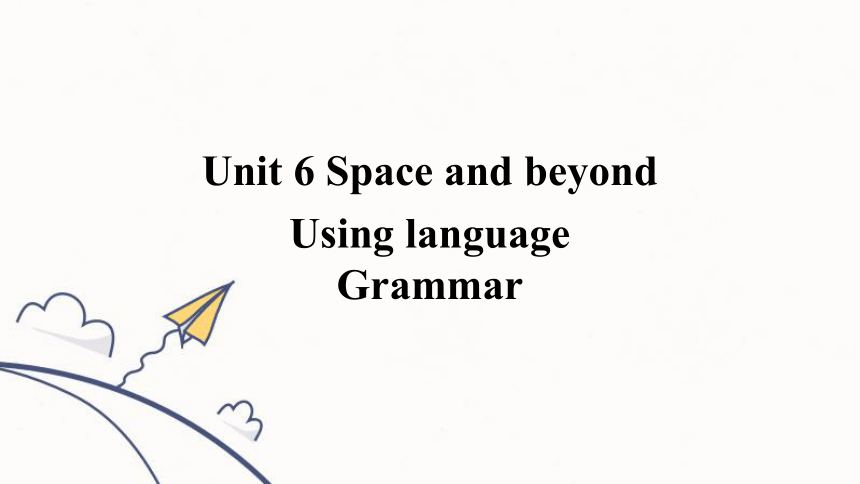 | |
| 格式 | pptx | ||
| 文件大小 | 8.2MB | ||
| 资源类型 | 教案 | ||
| 版本资源 | 外研版(2019) | ||
| 科目 | 英语 | ||
| 更新时间 | 2025-04-22 17:29:44 | ||
图片预览

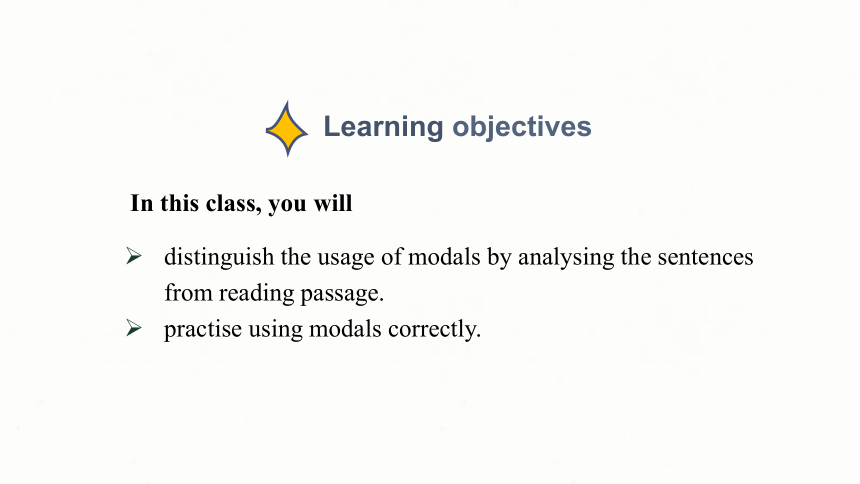
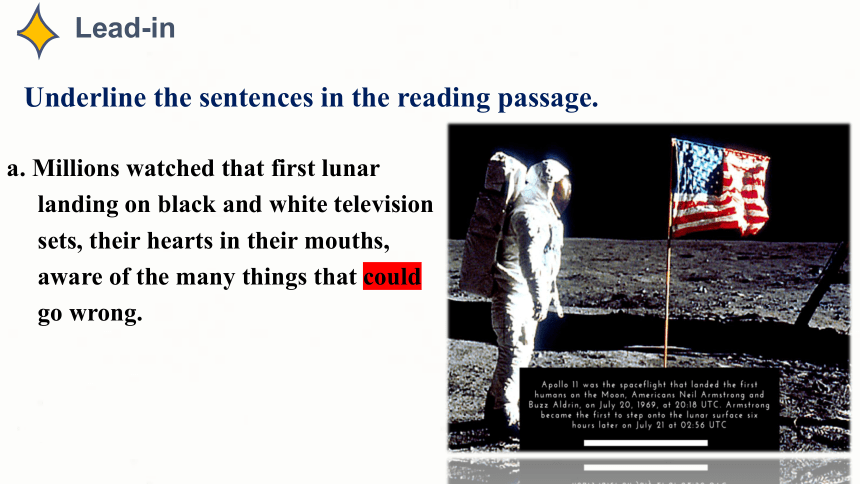

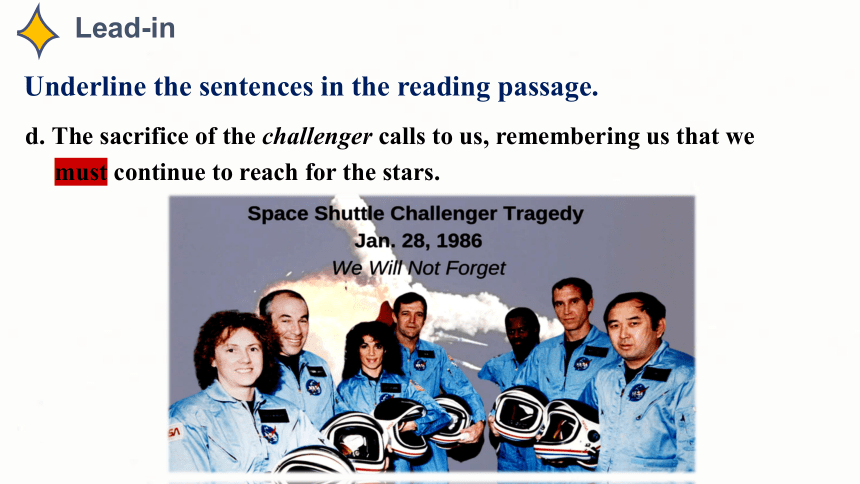



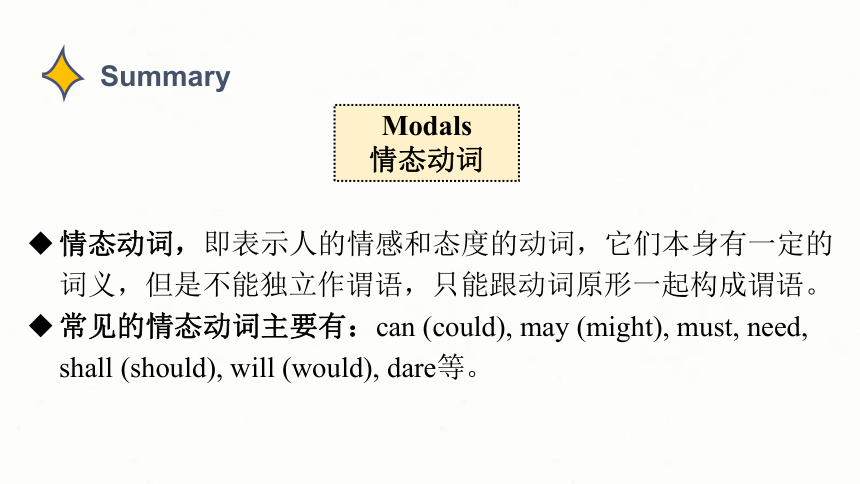
文档简介
(共21张PPT)
Using language
Grammar
Unit 6 Space and beyond
In this class, you will
distinguish the usage of modals by analysing the sentences from reading passage.
practise using modals correctly.
Learning objectives
a. Millions watched that first lunar landing on black and white television sets, their hearts in their mouths, aware of the many things that could go wrong.
Underline the sentences in the reading passage.
Lead-in
b. The world went into shock. Most people have assumed that the space flight would be no more dangerous than travelling in an aeroplane.
c. I can remember that day so clearly, watching the take-off on TV at school.
Underline the sentences in the reading passage.
Lead-in
d. The sacrifice of the challenger calls to us, remembering us that we must continue to reach for the stars.
Underline the sentences in the reading passage.
Lead-in
a. Millions watched that first lunar landing… aware… of the many things that could go wrong.
b. The world went into shock, most people having assumed that this space flight would be no more dangerous than travelling in an aeroplane.
c. I can remember that day so clearly, watching the take-off on TV at school, …
d. The sacrifice of the Challenger calls to us, reminding us that we must continue to reach for the stars, …
Look at the sentences and answer the questions.
1 Which sentence talks about ability
2 Which sentence talks about possibility
3 Which sentence talks about necessity
4 Which sentence talks about prediction
Presentation
a. Millions watched that first lunar landing… aware… of the many things that could go wrong.
b. The world went into shock, most people having assumed that this space flight would be no more dangerous than travelling in an aeroplane.
c. I can remember that day so clearly, watching the take-off on TV at school, …
d. The sacrifice of the Challenger calls to us, reminding us that we must continue to reach for the stars, …
Look at the sentences and answer the questions.
ability
possibility
necessity
prediction
Presentation
Look for more sentences with modals in the reading passage.
With the eyes of the students across the nation upon her, she might have inspired an entirely new generation of astronauts and space scientists.
The sacrifice of the challenger calls to us, remembering us that we must continue to reach for the stars, no matter how distant they might seem.
possibility
possibility
Presentation
情态动词,即表示人的情感和态度的动词,它们本身有一定的词义,但是不能独立作谓语,只能跟动词原形一起构成谓语。
常见的情态动词主要有:can (could), may (might), must, need, shall (should), will (would), dare等。
Modals
情态动词
Summary
用法 例句
表示能力, 意为“能,会”; could表示过去的能力。 She can speak French fluently.
她能讲一口流利的法语。
can可用于肯定句中,表示客观或理论上的可能性。 An experienced teacher can make mistakes.
一位有经验的老师也会犯错。
表示请求或允许。在疑问句中,could可以代替can,语气更委婉,肯定回答时要用can,不用could。 — Can/Could I use your bike tomorrow morning
明天上午我可以用你的自行车吗
— Yes, you can. 是的,可以。
表示说话者的主观推测,意为“可能”,用于否定句和疑问句中。can比could语气强。 He can’t be our manager. He has gone to Beijing.
他不可能是我们经理。他已经去北京了。
表示惊异、怀疑、迷惑等态度,常用于否定句和疑问句中。 How can you treat me like that
你怎么能那样对我
一、常见情态动词的用法:can和could
用法 例句
表示请求或许可。在疑问句中,might可以代替may,语气更加委婉。给予许可时用may,不用might。 — Might I ask for a picture of your little
daughter
— Yes, you may.
— 我可以要一张你小女儿的照片吗
— 是的, 可以。
表示推测,意为“或许,可能”,通常用于肯定句和否定句中。might比may语气弱。 — I really don’t like James. Why did you
invite him
— Don’t worry. He might not come.
— 我真的不喜欢詹姆斯。你为什么邀请他
— 别担心。他或许不会来。
表示祝愿,常用结构为:May+主语+动词原形! May you be happy every day!
愿你快乐每一天!
一、常见情态动词的用法:may和might
用法 例句
表示义务,意为“必须”。must强调说话人的主观看法, have to则强调客观需要;在回答带有must的问句时,否定式常用need not (needn’t)或don’t have to,而不是用must not。 We must act as quickly as possible now.
现在我们必须尽快采取行动。
I have to go now, because my mother is in hospital.
我现在不得不走了,因为我母亲在住院。
must用来表示推测,意为“一定”,只能用在肯定句中。must的肯定程度比can强。 You must be hungry after a long walk.
长途跋涉之后,你肯定饿了。
must表示“偏要,非要……不可”。常用于疑问句和条件句中,偶尔也用于陈述句中。 If you must go, at least wait until the storm is over.
如果你非要走,至少要等到暴风雨停了。
mustn’t表示禁止,意为“不得,不允许;一定不要”。 You mustn’t play with the knife, or you may hurt yourself.
你千万不要玩刀,否则会伤到自己的。
一、常见情态动词的用法:must和have to
用法 例句
用于第一、三人称的疑问句中,表示说话者征求对方的意见。 Shall he come in now
他现在可以进来吗
用于第二、三人称的陈述句中,表示说话者的命令、警告、威胁、允诺、决心等。 You shall be punished for what you have done.
你会为你的所作所为受到惩罚。
用于条约、规定、法令、法律等文件中表示义务规定,意为“必须”。 One of our rules is that every student shall wear school uniform while at school.
我们有一条规定,那就是每个学生在校期间都必须穿校服。
一、常见情态动词的用法:shall
用法 例句
should表示责任、义务、劝告、建议等,意为“应该”。 We should be strict with ourselves.
我们应该严格要求自己。
should表示出乎意料、惊讶的口气,意为“竟然,居然”。 Such a gentleman should do that.
这样一位绅士竟然会做那种事。
ought to表示义务、责任、劝告等,意为“应该”,语气比should略重。 You ought not to be so selfish.
你不应该这么自私。
should和ought to表示推测,指合乎理想的情况或结果,意为“按说应该”。 Try phoning Robert—he should be home by now.
给罗伯特打个电话试试,他现在应该到家了。
一、常见情态动词的用法:should和ought to
用法 例句
与各种人称连用,用于陈述句中,表示主语的意志、意愿或决心。will指现在,would指过去。 I will never talk to him again.
我再也不会和他说话了。
表示征求意见或提出请求,多用于第二人称疑问句中。would比will语气委婉。 Will/Would you please close the window
请把窗户关上好吗
表示习惯性动作、固有属性或必然趋势,意为“总是;习惯于”。will指现在,would指过去。 Fish will die without water.
没有水,鱼会死的。
一、常见情态动词的用法:will和would
用法 例句
used to do表示“过去常常做……”。 There used to be a building at the street corner, but now it is a library.
街道拐角处过去有座楼房,而现在是一个图书馆。
had better do表示“最好做……”,其否定形式为had better not do。 One had better see life in its various aspects when young.
一个人最好在年轻时就能看到生活的各个方面。
would rather do than do表示“宁愿做……”。 I would rather stare at the star-filled sky than watch a TV set.
我宁可凝视繁星满天的夜空也不愿看电视。
二、其他情态动词的用法
could have done 本可以
can’t/couldn’t have done 不可能做过
may/might have done 可能做过
must have done 一定做过
should/ought to have done 本应该/竟然做过
needn’t have done 本不需要做
had better have done 当时最好做过
would like/love to have done 宁愿做过
From what you said,she must have told you all about it.
从你所说的来看,她一定把一切都告诉你了。
Mr Smith can’t have gone to Beijing, for I saw him in the library just now.
史密斯先生不可能去北京了,因为我刚才还在图书馆看见他了。
三、情态动词+have done
Read the passage and choose the correct modals.
On 15 October 1997, the Cassini spacecraft set out on a mission to explore the planet Saturn. So great was the distance from Earth that it would/shall need to travel for almost six years to reach its destination. When it reached Saturn, it sent back amazing images of the planet’s famous rings viewed in ultraviolet light. Cassini made numerous trips around Saturn so it could /must collect data. Over the following years, Cassini took some 450, 000 images of the planet and its moons. Finally, on 15 September 2017, Cassini was pointed towards Saturn so that it should / would meet a fiery end. Scientists had decided that Cassini could /must be destroyed this way, so it must/would not collide with any of Saturn’s moons. In its nearly 20-year mission, Cassini provided so much information that scientists could/ would not process it all. No wonder so many people took to social media to bid it goodbye, saying, “Farewell, dear Cassini! We shall / should never forget you!”
√
√
√
√
√
√
√
prediction
ability
prediction
necessity
prediction
ability
determination
Practice
Look at the picture and tell a story using modals where appropriate.
Zhurong 4th
Space flight
Mount Olympus
I couldn’t believe it when I looked into the Martian sky …
could; might; must; shall; would…
Production
Look at the picture and tell a story using modals where appropriate.
could; might; must; shall; would…
I couldn’t believe it when I looked into the Martian sky, which was dark yellowish-brown for plenty of dust remained in the atmosphere. In the distance stood an active volcano whose next eruption might be a few years later. What impressed me most was Zhurong 4th, which could travel faster and farther and would continue travelling south. Never in my dream could I imagine that plants were growing there, with reddish-orange flowers like thistles (蓟). Never shall I forget that day! You should see it with you own eyes!
Production
Take it in turns to draw a picture of space exploration and ask your partner to tell a story based on it.
Organise ideas in a logical way.
Use modals where appropriate.
Production
Using language
Grammar
Unit 6 Space and beyond
In this class, you will
distinguish the usage of modals by analysing the sentences from reading passage.
practise using modals correctly.
Learning objectives
a. Millions watched that first lunar landing on black and white television sets, their hearts in their mouths, aware of the many things that could go wrong.
Underline the sentences in the reading passage.
Lead-in
b. The world went into shock. Most people have assumed that the space flight would be no more dangerous than travelling in an aeroplane.
c. I can remember that day so clearly, watching the take-off on TV at school.
Underline the sentences in the reading passage.
Lead-in
d. The sacrifice of the challenger calls to us, remembering us that we must continue to reach for the stars.
Underline the sentences in the reading passage.
Lead-in
a. Millions watched that first lunar landing… aware… of the many things that could go wrong.
b. The world went into shock, most people having assumed that this space flight would be no more dangerous than travelling in an aeroplane.
c. I can remember that day so clearly, watching the take-off on TV at school, …
d. The sacrifice of the Challenger calls to us, reminding us that we must continue to reach for the stars, …
Look at the sentences and answer the questions.
1 Which sentence talks about ability
2 Which sentence talks about possibility
3 Which sentence talks about necessity
4 Which sentence talks about prediction
Presentation
a. Millions watched that first lunar landing… aware… of the many things that could go wrong.
b. The world went into shock, most people having assumed that this space flight would be no more dangerous than travelling in an aeroplane.
c. I can remember that day so clearly, watching the take-off on TV at school, …
d. The sacrifice of the Challenger calls to us, reminding us that we must continue to reach for the stars, …
Look at the sentences and answer the questions.
ability
possibility
necessity
prediction
Presentation
Look for more sentences with modals in the reading passage.
With the eyes of the students across the nation upon her, she might have inspired an entirely new generation of astronauts and space scientists.
The sacrifice of the challenger calls to us, remembering us that we must continue to reach for the stars, no matter how distant they might seem.
possibility
possibility
Presentation
情态动词,即表示人的情感和态度的动词,它们本身有一定的词义,但是不能独立作谓语,只能跟动词原形一起构成谓语。
常见的情态动词主要有:can (could), may (might), must, need, shall (should), will (would), dare等。
Modals
情态动词
Summary
用法 例句
表示能力, 意为“能,会”; could表示过去的能力。 She can speak French fluently.
她能讲一口流利的法语。
can可用于肯定句中,表示客观或理论上的可能性。 An experienced teacher can make mistakes.
一位有经验的老师也会犯错。
表示请求或允许。在疑问句中,could可以代替can,语气更委婉,肯定回答时要用can,不用could。 — Can/Could I use your bike tomorrow morning
明天上午我可以用你的自行车吗
— Yes, you can. 是的,可以。
表示说话者的主观推测,意为“可能”,用于否定句和疑问句中。can比could语气强。 He can’t be our manager. He has gone to Beijing.
他不可能是我们经理。他已经去北京了。
表示惊异、怀疑、迷惑等态度,常用于否定句和疑问句中。 How can you treat me like that
你怎么能那样对我
一、常见情态动词的用法:can和could
用法 例句
表示请求或许可。在疑问句中,might可以代替may,语气更加委婉。给予许可时用may,不用might。 — Might I ask for a picture of your little
daughter
— Yes, you may.
— 我可以要一张你小女儿的照片吗
— 是的, 可以。
表示推测,意为“或许,可能”,通常用于肯定句和否定句中。might比may语气弱。 — I really don’t like James. Why did you
invite him
— Don’t worry. He might not come.
— 我真的不喜欢詹姆斯。你为什么邀请他
— 别担心。他或许不会来。
表示祝愿,常用结构为:May+主语+动词原形! May you be happy every day!
愿你快乐每一天!
一、常见情态动词的用法:may和might
用法 例句
表示义务,意为“必须”。must强调说话人的主观看法, have to则强调客观需要;在回答带有must的问句时,否定式常用need not (needn’t)或don’t have to,而不是用must not。 We must act as quickly as possible now.
现在我们必须尽快采取行动。
I have to go now, because my mother is in hospital.
我现在不得不走了,因为我母亲在住院。
must用来表示推测,意为“一定”,只能用在肯定句中。must的肯定程度比can强。 You must be hungry after a long walk.
长途跋涉之后,你肯定饿了。
must表示“偏要,非要……不可”。常用于疑问句和条件句中,偶尔也用于陈述句中。 If you must go, at least wait until the storm is over.
如果你非要走,至少要等到暴风雨停了。
mustn’t表示禁止,意为“不得,不允许;一定不要”。 You mustn’t play with the knife, or you may hurt yourself.
你千万不要玩刀,否则会伤到自己的。
一、常见情态动词的用法:must和have to
用法 例句
用于第一、三人称的疑问句中,表示说话者征求对方的意见。 Shall he come in now
他现在可以进来吗
用于第二、三人称的陈述句中,表示说话者的命令、警告、威胁、允诺、决心等。 You shall be punished for what you have done.
你会为你的所作所为受到惩罚。
用于条约、规定、法令、法律等文件中表示义务规定,意为“必须”。 One of our rules is that every student shall wear school uniform while at school.
我们有一条规定,那就是每个学生在校期间都必须穿校服。
一、常见情态动词的用法:shall
用法 例句
should表示责任、义务、劝告、建议等,意为“应该”。 We should be strict with ourselves.
我们应该严格要求自己。
should表示出乎意料、惊讶的口气,意为“竟然,居然”。 Such a gentleman should do that.
这样一位绅士竟然会做那种事。
ought to表示义务、责任、劝告等,意为“应该”,语气比should略重。 You ought not to be so selfish.
你不应该这么自私。
should和ought to表示推测,指合乎理想的情况或结果,意为“按说应该”。 Try phoning Robert—he should be home by now.
给罗伯特打个电话试试,他现在应该到家了。
一、常见情态动词的用法:should和ought to
用法 例句
与各种人称连用,用于陈述句中,表示主语的意志、意愿或决心。will指现在,would指过去。 I will never talk to him again.
我再也不会和他说话了。
表示征求意见或提出请求,多用于第二人称疑问句中。would比will语气委婉。 Will/Would you please close the window
请把窗户关上好吗
表示习惯性动作、固有属性或必然趋势,意为“总是;习惯于”。will指现在,would指过去。 Fish will die without water.
没有水,鱼会死的。
一、常见情态动词的用法:will和would
用法 例句
used to do表示“过去常常做……”。 There used to be a building at the street corner, but now it is a library.
街道拐角处过去有座楼房,而现在是一个图书馆。
had better do表示“最好做……”,其否定形式为had better not do。 One had better see life in its various aspects when young.
一个人最好在年轻时就能看到生活的各个方面。
would rather do than do表示“宁愿做……”。 I would rather stare at the star-filled sky than watch a TV set.
我宁可凝视繁星满天的夜空也不愿看电视。
二、其他情态动词的用法
could have done 本可以
can’t/couldn’t have done 不可能做过
may/might have done 可能做过
must have done 一定做过
should/ought to have done 本应该/竟然做过
needn’t have done 本不需要做
had better have done 当时最好做过
would like/love to have done 宁愿做过
From what you said,she must have told you all about it.
从你所说的来看,她一定把一切都告诉你了。
Mr Smith can’t have gone to Beijing, for I saw him in the library just now.
史密斯先生不可能去北京了,因为我刚才还在图书馆看见他了。
三、情态动词+have done
Read the passage and choose the correct modals.
On 15 October 1997, the Cassini spacecraft set out on a mission to explore the planet Saturn. So great was the distance from Earth that it would/shall need to travel for almost six years to reach its destination. When it reached Saturn, it sent back amazing images of the planet’s famous rings viewed in ultraviolet light. Cassini made numerous trips around Saturn so it could /must collect data. Over the following years, Cassini took some 450, 000 images of the planet and its moons. Finally, on 15 September 2017, Cassini was pointed towards Saturn so that it should / would meet a fiery end. Scientists had decided that Cassini could /must be destroyed this way, so it must/would not collide with any of Saturn’s moons. In its nearly 20-year mission, Cassini provided so much information that scientists could/ would not process it all. No wonder so many people took to social media to bid it goodbye, saying, “Farewell, dear Cassini! We shall / should never forget you!”
√
√
√
√
√
√
√
prediction
ability
prediction
necessity
prediction
ability
determination
Practice
Look at the picture and tell a story using modals where appropriate.
Zhurong 4th
Space flight
Mount Olympus
I couldn’t believe it when I looked into the Martian sky …
could; might; must; shall; would…
Production
Look at the picture and tell a story using modals where appropriate.
could; might; must; shall; would…
I couldn’t believe it when I looked into the Martian sky, which was dark yellowish-brown for plenty of dust remained in the atmosphere. In the distance stood an active volcano whose next eruption might be a few years later. What impressed me most was Zhurong 4th, which could travel faster and farther and would continue travelling south. Never in my dream could I imagine that plants were growing there, with reddish-orange flowers like thistles (蓟). Never shall I forget that day! You should see it with you own eyes!
Production
Take it in turns to draw a picture of space exploration and ask your partner to tell a story based on it.
Organise ideas in a logical way.
Use modals where appropriate.
Production
